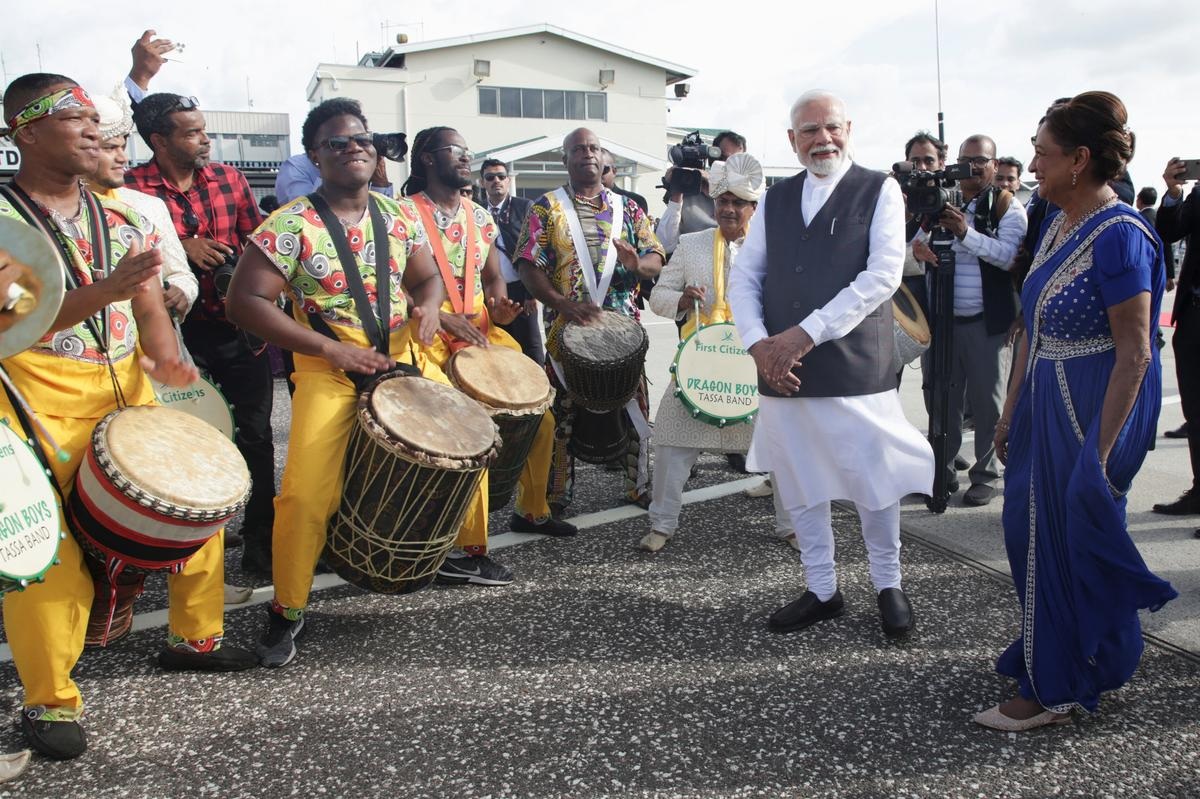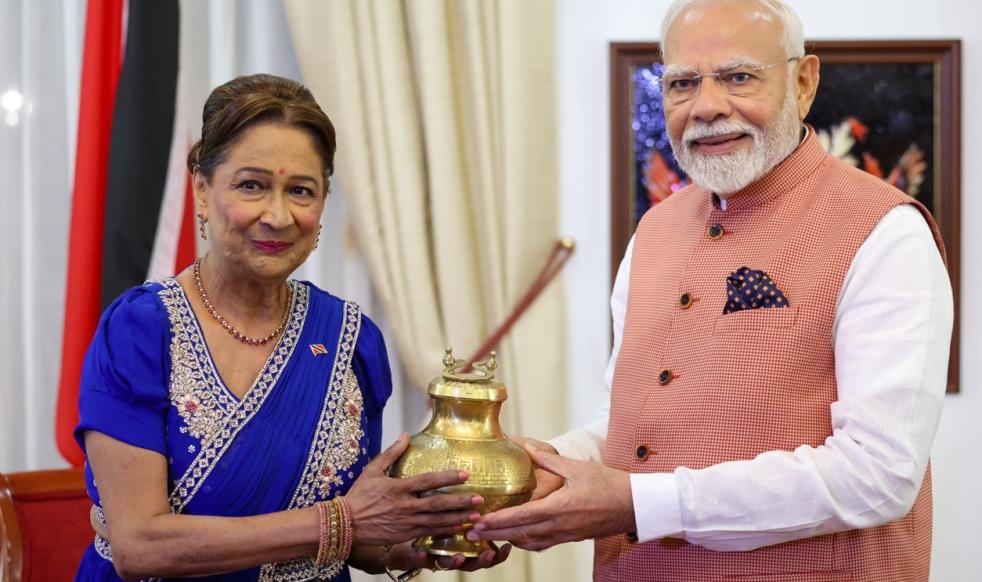On 4 July 2025, India’s Prime Minister Narendra Modi made a landmark entry into Trinidad & Tobago, marking the first bilateral visit by a sitting Indian premier since 1999. He was warmly received at Piarco International Airport by Prime Minister Kamla Persad‑Bissessar, affectionately hailed during the ceremony by Modi as “Bihar ki Beti”, acknowledging her ancestral roots in Buxar, Bihar.
The event featured a ceremonial Guard of Honour and a vibrant Bhojpuri Chautaal performance, celebrating cultural bonds between India and the Indo-Trinidadian community, where nearly 40% of the nation's population traces its heritage to India. Modi expressed gratitude, saying, “I thank Prime Minister Kamla Persad‑Bissessar, distinguished members of the Cabinet and MPs for the gesture of welcoming me at the airport,” and noted the tour would “further cement bilateral ties between our nations.”

“Prime Minister Kamla Persad‑Bissessar’s ancestors came from Buxar in Bihar. She has also visited the place. People here consider her a ‘Bihar ki Beti.’ Bihar’s heritage is not just the pride of India—it is the pride of the whole world. It has shown the way in democracy, education and governance for centuries. New inspirations and opportunities from Bihar will emerge in this 21st-century world”- Modi said.
Over the next two days, Modi embarked on a richly woven itinerary including high-level meetings, cultural engagements, diaspora events, and strategic partnership discussions.
Trinidad & Tobago’s Highest Honour
Later on 4 July, PM Modi received the Order of the Republic of Trinidad & Tobago (ORTT)—the nation’s most prestigious civilian award—becoming the first Indian PM to ever receive it. Presented by Persad‑Bissessar, it signified deep respect for India–T&T relations and the diaspora’s heritage.
The award was celebrated by the Indo-Trinidadian Hindu community as a symbolic recognition of historical ties dating back to indentured labour in the 19th century. However, critics from the Muslim community, notably the Anjuman Sunnat-ul-Jamaat Association (ASJA), voiced concerns, citing Modi’s controversial domestic policies, including the 2002 Gujarat riots and Kashmir’s altered status. The split reception underlines the complex interplay of diplomacy, identity, and human rights.

Cultural Diplomacy and Symbolic Gestures
That evening’s state dinner, hosted at the official residence of PM Persad‑Bissessar, showcased warm cultural diplomacy. Modi was served on Sohari leaves, a traditional Trinidadian plate with Indian origins, which he called a symbol of “great cultural significance”.
During the gathering, he presented a replica of the Ram Mandir, along with holy water from Ayodhya’s Sarayu River and the Mahakumbh festival in Prayagraj, highlighting enduring spiritual ties. Modi met cultural figures such as Rana Mohip—renowned for performing Vaishnava Jana To—signifying a gesture of cultural continuity and mutual respect.
Persad‑Bissessar praised Modi’s global leadership and called the visit "a profound honour," particularly resonant with the Indian-origin community. The evening reiterated the shared civilizational fabric stretching from Bihar to the Caribbean.
Digital Diplomacy and Diaspora
A major theme of the visit was technological partnership. Modi announced that Trinidad & Tobago would become the first Caribbean nation to adopt India’s UPI (Unified Payments Interface), calling it a “revolution” for seamless transactions. “Sending money will be as easy as sending a good-morning text,” he said.
During his community address in Port of Spain, he expanded Overseas Citizenship of India (OCI) to include individuals up to the sixth generation of Indian origin, declaring, “You are connected by belonging, not just blood,” and urging diaspora members to reconnect with their ancestral villages. He celebrated cultural connections, noting streets named Banaras, Patna, Kolkata, and Delhi in Trinidad.
Meeting winners of the Bharat Ko Janiye quiz, Modi highlighted diaspora youth as “Rashtradoots” embodying India’s values and heritage. These gestures deepened roots, extending both cultural and economic engagement.

Strategic Agreements & Parliamentary Outreach
On 5 July, PM Modi addressed Trinidad’s joint Parliament session, showcasing cooperation across trade, energy, health, agriculture, security, and artificial intelligence. He reinforced support for the Global South, stating, “It’s time … to give the Global South its rightful seat at the table”.
PM Persad‑Bissessar matched his tone, describing Modi as “a transformational force” whose governance has modernised India’s economy and provided vaccines during the Covid-19 pandemic.
During the visit, six key memorandums of understanding (MoUs) were signed, spanning vocational training, digital finance, and healthcare cooperation, while Trinidad & Tobago expressed support for India’s bid for a permanent seat on the United Nations Security Council, with India pledging backing for Trinidad’s bid for a non-permanent UNSC seat in 2027–28 .
Modi also highlighted India’s global achievements—unicorn startups, Chandrayaan-3’s moon mission, and digital growth—asserting India’s emergence as a major global partner to the Caribbean .
Reflections, Criticism, and Looking Ahead
Soft Power in Action
Modi’s use of cultural elements—Bhojpuri Chautaal, Sohari leaf, Ram Mandir—underscores India’s strategic soft power. These acts foster goodwill and emotional resonance within the diaspora.
Community Unity & Dissent
His visit, while applauded by the Hindu majority, prompted pushback from Muslim groups like ASJA, highlighting the political implications tied to human rights discourse
Global South Strategy
The visit reinforces India’s diplomatic pivot towards South–South cooperation, positioning itself as a tech, trade, and cultural partner with nations beyond traditional Western alliances .
What Next?
UPI's rollout could revolutionise remittances and fintech integration. OCI expansion may solidify generational ties and diaspora contributions. Follow-up on signed MoUs will shape healthcare, vocational, and digital collaborations over the next year.
The Broader Picture
Looking ahead, PM Modi’s visit has opened a new chapter in India–Trinidad & Tobago relations. It wove cultural heritage, digital innovation, and geopolitical diplomacy into a cohesive narrative. As he concluded his remarks—“This visit will further cement our bilateral ties”—it was clear that the confluence of symbolic warmth and strategic intent marks a landmark in global diplomacy for both nations

 131 Views
131 Views 0 comments
0 comments
Comments